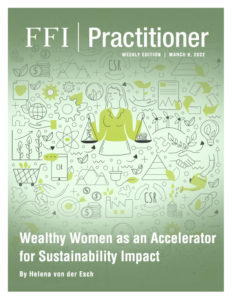
View this edition in our enhanced digital edition format with supporting visual insight and information.
This week, we are pleased to share a summary of a recent survey of wealthy Nordic women aimed at gaining a better understanding of what drives their investing decisions. Thank you to this week’s contributor, Helena von der Esch, for sharing a summary of the study’s findings and the practical implications for advisors in their work with family enterprise clients.
Sustainability is a primary issue for wealthy women living in Nordic countries in terms of investing their capital. A unique survey1 conducted in 2020 by Formue in collaboration with Kantar Sifo Prospera put 400 wealthy women, with a fortune that they control, in the spotlight. The survey’s goal was to share improved knowledge and a better understanding about this group of women who create and manage substantial wealth. The questions this survey sought to answer included the following:
- What role does financial capital play in their lives?
- What do these women wish to achieve with their financial capital?
- What factors are considered before making an investment?
- What is the value of overseeing a fortune?
Not surprisingly, the survey indicates that there are similarities as well as differences among wealthy women in Sweden, Norway, and Denmark.
The financial industry has historically been controlled by men, on both the advisor and client side. Even though there is an increasing representation of women in these and other related industries, it’s still a male-dominated part of the business world.2 As of today, an estimated one-third of the global wealth is controlled by women—an increasing proportion of the global wealth, which is expected to grow extensively in parallel with family business successions, in which the rising generation is seeing an increase of women in leadership and entrepreneurship roles.3 The researchers discern a shift that represents one of the major and perhaps most important economic changes of today and the near future.
Today, more and more advisors share the experience that client conversations with women are more holistic, in-depth, and long-term focused. All long-term and engaged factors are key in successfully cultivating growth of family wealth. Effective advisors can help to provide clients with an outside perspective, based on regulations, academic research, and experience with long-term objectives. According to the survey respondents, yet another area of great interest is sustainable investing, or ESG—investments that consider environmental, social, and governance issues. The majority of wealthy Scandinavian women surveyed see sustainability of their investments as a primary issue. In Sweden, as many as 75 percent of the respondents indicated that it is important to make investments that contribute to a sustainable society, without lowering the expectations on return of the investments.
As the number of female investors increases, the understanding between advisors and their clients requires constant and rapid transformation. Clients have the right to expect their advisors to be ahead of the curve, with an accurate interpretation of what today’s family business owners are looking for. The survey also points out that wealthy Nordic women appreciate the possibility of creating something new.
In addition, only three percent of the responding women link financial capital with status. Imagine how potentially tense the advisor-client relationship could become if the advisor suggests investments in line with the assumption that the client views wealth exclusively as a status symbol, or if he or she advises such clients to avoid taking the risk of investing in innovation. A sustainable investment could be overlooked, to the detriment of the client-advisor relationship, and possibly to society at large. To avoid such pitfalls, advisors to wealth creators and business owners should expand the concept of performance and value creation to a broader and changing arena of client profiles.
In conclusion, I present four recommendations for advisors based on these survey results.
- Address all clients as individuals and look beyond gender.
- Get involved and be engaged in female entrepreneurial and financial networks and listen carefully to their goals and concerns.
- Stay up to date on relevant news and theories concerning women business-owners and wealth-owners with new research, surveys, and case studies.
- Facilitate open conversations with all clients about what they wish to achieve in their lifetimes before jumping to any conclusions.
References
1 Formue. (2020). Scan Her Wealth: How wealthy Scandinavian women view being wealthy. Retrieved January 18, 2022, via https://1892y212chg2qnnse3pp9xp1-wpengine.netdna-ssl.com/wp-content/uploads/2021/06/Formuesforvaltning_ScanHerWealth_EN_FINAL.pdf
2Levaux, J. (2021, January 28). Women in Wealth: Why It’s Their Moment. ThinkAdvisor. https://www.thinkadvisor.com/2021/01/28/women-in-wealth-why-its-their-moment/
3Zakrewski, A., Reeves, K.N., Kahlich, M., Klein, M., Mattar, A.R., & Knobel, S. (2020, April 9). Managing the Next Decade of Women’s Wealth. https://www.bcg.com/publications/2020/managing-next-decade-women-wealth
About the Contributor

Helena von der Esch, FFI Fellow, is Senior Family Advisor at the independent wealth advisor group Formue in Stockholm, Sweden. She has been an FFI GEN Faculty member since 2017 and has experience facilitating succession planning and creating governance strategies. She can be reached at helena.vdesch@formue.se.

View this edition in our enhanced digital edition format with supporting visual insight and information.





